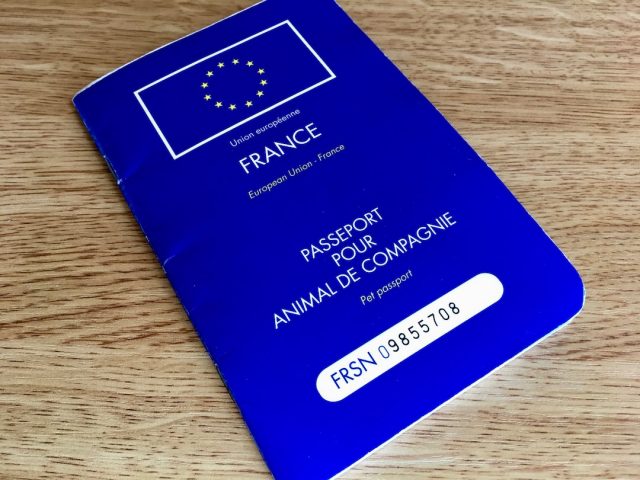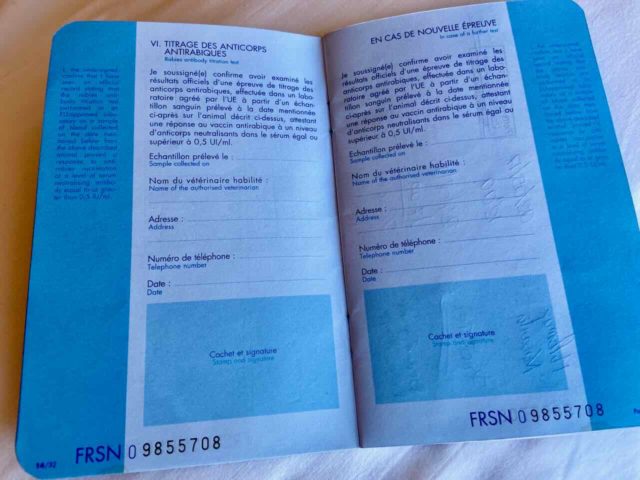One of the best things about travelling around Europe with a dog is that you don’t need to visit a vet and fill in paperwork to travel between many countries, unlike in other parts of the world. This is thanks to many of the countries in Europe belonging to the European Union (or EU for short) and its single set of rules making it easy for pets to travel around the EU and a handful of other countries.
But what preparations are required to travel with your dog in between EU countries? Which border crossings does this apply to? And what about the rules for travelling with your dog between other countries? I take you through all the rules for dog travel between European countries.

Travelling Between EU and Related Countries
When travelling between countries within the EU and a number of “related” countries, this page sets out the requirements for your dog. Essentially, your dog needs to be microchipped, have been vaccinated for rabies at least 21 days ago, and have a pet passport. For a handful of countries, there is also the requirement for the dog to have a worming treatment.
What Countries are in the European Union?
Currently, there are 27 countries in Europe that are part of the EU. These countries are: Austria, Belgium, Bulgaria, Croatia, Cyprus, Czech Republic, Denmark, Estonia, Finland, France, Germany, Greece, Hungary, Ireland, Italy, Latvia, Lithuania, Luxembourg, Malta, Netherlands, Poland, Portugal, Romania, Slovakia, Slovenia, Spain, and Sweden.
Additionally, since the United Kingdom transitioned out of the EU following Brexit, Northern Ireland is still counted as part of the EU for the purposes of pet transport.
What are the “Related” Countries?
The EU counts a small number of other countries and territories as applying rules equivalent to the EU for the transportation of pets. The same rules apply for dogs crossing from these countries into EU countries. The pet passport can be either an EU pet passport or a pet passport issued by one of these countries.
These countries are also referred to as “Part 1 listed” countries and are listed on this page in the top table. These seven countries and three territories are: Andorra, Faroe Islands, Gibraltar, Greenland, Iceland, Liechtenstein, Monaco, San Marino, Switzerland and Vatican City State. Additionally, Norway is included.

Note however that more onerous conditions may apply for transporting pets back into some of these countries! This is the case for both the Faroe Islands and Iceland. The Faroe Islands only allows pets to be imported if you intend to stay for longer than three months, while Iceland requires a 14-day quarantine period and pets can only be imported from a short list of approved countries.
What Countries Require a Worming Treatment?
For a handful of the EU and related countries, a worming treatment is required to be administered to your dog by a vet, before arriving in the country. This is also referred to as the “treatment against Echinococcus multilocularis“. It needs to be administered between 24 hours and five days before arrival and recorded in your pet’s passport.
This is required for dogs travelling to: Finland, Ireland, Malta, Northern Ireland and Norway and the United Kingdom. Note that this treatment is not required for dogs travelling in between these countries, such as between Northern Ireland and Ireland.

Do Pets from Other Countries Require a Pet Passport?
If you travelled from outside of the EU with your pet, you would have required an animal health certificate or “Annex IV” to enter the EU. If you initially entered one of the related countries, you would have likely used the same or a similar form.
When you arrive in Europe, you should try and get this stamped by customs. Even if it isn’t stamped, you should hold onto it during your travels around Europe. This certificate is then valid for travel within the EU for four months after your entry and should be shown in place of an EU pet passport.
Alternatively, you may be interested in getting an EU pet passport for your pet. The pet passport makes it easier to return to Europe with your pet. (You don’t need to have an Annex IV completed, unless your pet has been vaccinated outside of the EU.)
If you need to have a worming treatment done by a vet, it’s easiest to get an EU pet passport at the same time. (This is what I did before travelling to the UK with my dog, prior to Brexit.)
Are Pet Passports Really Checked?
Just like human passports are often not checked when travelling in between the Schengen countries, pet passports are generally not checked when travelling within the EU and these related countries, at least when not flying. Although there is always the expectation that your pet does have a passport and it may be checked!

Other than when checking into flights, our pet passport was only checked when we travelled to Malta, plus when we travelled to the United Kingdom prior to Brexit. Malta is one of the countries that is quite stringent with the importation of pets, and I recommend reading my specific guidelines for how to take your dog to Malta.
I’ve also heard of someone being turned down for boarding a ferry to Corsica from mainland France, as their dog’s rabies vaccine wasn’t up-to-date.
On the other hand, despite also needing a worming treatment for dogs travelling to Finland and Norway, our dog’s passport wasn’t checked on either occasion, both at a road crossing and when boarding a ferry.
Any Additional Requirements for These Countries?
Generally, I’ve assumed that there are no additional requirements for pets travelling into any of the EU countries. However, this is not always the case.
For instance, when travelling to Malta you also need to advise the country in advance of your pet’s arrival, so that they can be checked by a vet on arrival. As Malta doesn’t have any land borders, you’ll likely be reminded of this if booking a flight or ferry trip to the country with your dog. I’ve covered the whole process in my guide to travelling to Malta with a dog.

Sweden also has the requirement to advise the country of your dog’s arrival, but only at the customs declaration point or through an online form, with no need to do it in advance. I didn’t actually find out about this until I was leaving the country, and luckily didn’t suffer any consequences. I cover this fully in my guide to travelling in Sweden with a dog.

I’m not aware of any other EU country that has any additional requirement, but I recommend double-checking the individual country websites listed here, if in doubt. When it comes to related countries, as I mentioned above both the Faroe Islands and Iceland have quite strict entry procedures.
What About Puppies?
There are some exceptions to the rabies vaccination requirements for young animals that are too young to be vaccinated. I don’t recommend travelling with animals so young for a holiday, but if they are crossing the border to go to their new home refer to the EU regulations.
Travelling into the EU from Other European Countries
If you are travelling into an EU country or one of the related countries from another European country, the rules are more complex and similar to travelling to Europe with your dog from elsewhere in the world.
Depending on what country you are travelling from, a rabies titre test may or may not be required. Additionally, an animal health certificate or “Annex IV” will be required if you don’t have a pet passport from the EU or a related country.
Which Countries Require a Rabies Titre Test?
If you are travelling into the EU from these European countries, a rabies titre test is required: Albania, Armenia, Azerbaijan, Georgia, Moldova, Montenegro, Serbia, Turkey, Ukraine.
A rabies titre test is not required for “Part 2 listed” countries, as listed on the bottom table on this page. These five European countries are included: Belarus, Bosnia and Herzegovina, North Macedonia, Russia, United Kingdom (including Guernsey, Isle of Man and Jersey).
What are the Requirements of the Rabies Titre Test?
There are a number of rules stipulated by the EU for the administration of a rabies titre test, if your dog requires one to travel to the EU.
The sample for the test needs to be collected by an authorised veterinarian at least 30 days after your dog is vaccinated for rabies. The sample needs to be tested in an EU approved laboratory. Assuming a sufficient level of antibodies are detected (0.5 IU/ml or greater), you then need to wait three months after the sample collection date to enter the EU.

The rabies titre test though remains valid for the life of your pet, as long as they always receive their rabies vaccine booster shot before the previous one expires.
What About Pets from the EU?
If your pet is originally from the EU, it is advisable to get a rabies titre test done before leaving the EU. In this case, there is no waiting period applied. You can immediately travel back to the EU without waiting for three months after the rabies titre test. There is a section in the EU pet passport for recording your dog’s rabies titre test.

As noted above, the rabies titre test remains valid for the life of your pet, as long as they receive their next rabies booster shot before the previous one expires. If this doesn’t occur, your pet will require another rabies titre test (hence the room for recording multiple tests).
Is the Paperwork Really Checked?
During my travels around Europe, I didn’t actually make it to any of these countries. At first I wasn’t sure of the requirements for dogs travelling in between the countries (and didn’t realise that my rabies titre test from Australia was valid), and then I later ran out of time. So, I don’t have personal experience at travelling between these countries and the EU.
However, I have been informed by other travellers, that paperwork is not always checked when travelling from these countries into the EU. This includes travelling from Serbia into Bulgaria. However, it is advisable to always comply with the regulations and expect that paperwork may be checked.
If you go to cross the border and you haven’t had the rabies titre test done for your dog, there is a long waiting period. Especially if your dog is originally from within the EU and could have skipped the waiting period entirely!
What Entry Points are Allowed?
If you are entering an EU country or any of the related countries with your dog, you are required to enter at specific entry points, where your dog’s paperwork can be checked. These are known as “Travellers’ points of entry”, and may include airports, shipping ports and land border crossings.
To view the list of relevant entry points for each country, click here.
Travelling out of the EU to Other European Countries
When travelling from a country in the EU or one of the related countries to other countries in Europe, the list of requirements differs between different countries. You should check the requirements for the individual country.
Often it is sufficient to assume that travelling with your dog’s EU pet passport and an up-to-date rabies vaccine is sufficient, but this is not always the case.
At the moment, I have not yet travelled personally with my dog to these countries or investigated the details of the rules for most countries. As I investigate each country, I will list them here.
A handy initial place to check the rules is PetTravel.com, but always check the relevant government website to double-check your have the latest rules and the full details required.
Importing a Dog to Serbia
The rules to import a dog to Serbia are quite similar to the rules for importing a dog to EU countries.
For dogs being imported to Serbia from EU countries and the related countries, the rules are listed at the top of this page. Your dog needs to be permanently identified (such as by a microchip), vaccinated against rabies, comply with comply with any preventive health measures for other diseases, and be accompanied by either a passport or a health certificate, quite similar to the EU health certificate.
There are also rules listed for both Part 2 listed countries (as per the EU legalisation) and unlisted countries (generally higher risk countries). For unlisted countries, a rabies titre test is also required, performed by an EU approved lab, followed by a waiting period of three months.
Importing a Dog to Albania
The rules to import a dog to Albania are again relatively simple and similar to those for importing a dog to EU countries. The more complicated part is making sure you can re-enter the EU with your dog from Albania!
Your dog needs to have a microchip, be vaccinated against rabies (with 3 year vaccines recognised) and have a bi-lingual health certificate. For more information, see the guide put together on World Wide Walkies, along with plenty more tips about visiting Albania with a dog.
Importing a Dog to Turkey
The rules to import a dog to Turkey are not that clear, with different interpretations on different websites. At a minimum, your dog needs to be microchipped and vaccinated against rabies, at least 30 days in advance.
It is likely the 3-year rabies vaccine isn’t recognised, so make sure you dog has been vaccinated in the last year. Additionally, a rabies titre test may or may not be required. Read my full discussion on the rules for travelling to Turkey with a dog.

Is the 3-Year Rabies Vaccine Recognised?
Within the EU countries, the 3-year rabies vaccine is recognised. This means that if your dog receives a 3-year rabies vaccine, your dog does not need a booster shot for another three years. However, there are some countries around the world that only recognise 1-year rabies vaccines, and required your dog to have a booster shot yearly.
The following European countries require a yearly rabies vaccine (according to my investigations): Belarus, Moldova, Montenegro, Russia, Turkey, Ukraine.
You May Also Like
- Taking Your Dog to Europe: Vaccines & Paperwork
- Is it Possible to Visit Turkey with a Dog?
- Do I Need a Rabies Titre Test to Travel with My Dog?
About the Author

Shandos Cleaver is the founder of Travelnuity: Dog-Friendly Travel. She has travelled extensively with her Miniature Dachshund, Schnitzel, including to 33 countries across Europe, every state and territory of Australia except Tasmania, and 10 of the United States. She’s passionate about providing inspiration and information to others wanting to travel with their dogs, whether close to home or internationally.
Inspired? Pin this to your Pinterest board!


Wonderful article and you explained so much. Thank you so much!! We are traveling in Europe for 8 months (from the US) and visiting different locations. Couple quick questions and hope you may know the answer. We have the Pet Certificate and haven’t got a EU Passport, based on your article.. this pretty much takes the place of it. If we decide to get a EU Pet Passport, did this need to be applied for within so many days of our arrival in France or can we apply 3 months after arriving in France and nothing additional is required? We may go to Prague for the day when we are staying in Austria.. I noticed they need approval of your EU Pet Passport? Is this the case? I thought our Pet Certificate was good for travel in an country within the EU? Last question.. We plan on traveling for 8 months and our health certificate is good for four.. How do we get another one for the 2nd 4 months? Do we get that from a vet in the EU or will we have to go back to the US after 4 months. Any help would be appreciated. Thank you
The certificate you have is good for travel for 4 months, including Prague. The best thing to do before this period is up, or before you next cross country borders after 4 months, is to get a pet passport. France is being problematic about giving pet passports to pets who aren’t registered there, since the UK left the EU and many English have tried to get French pet passports. But most other countries should be fine. Some vets won’t transfer across the rabies vaccine, and may insist on a booster shot, that they will then record. Hope this is clear!
Brilliant article. Helps with so much but I think I’m just confusing myself. We’re going to Austria next year with our dog. She’ll get a rabies vaccination and an Animal Health Certificate before going. We’re using the tunnel and she’ll be checked in Calais. Our final destination is Austria. Does she have to get checked at their border too? Or not as it’s all the EU?
No, she only needs to get checked at the Tunnel when first entering the EU. Just keep the certificate handy in case you’re asked later when crossing borders, but it is extremely unlikely.
Great article! Can’t thank you enough! Just one thing that I couldn’t really find an answer anywhere. My pet is in the EU and has an EU passport. We will travel to Turkey and back. Do you know if she needs an EU health certificate also?
I’ve covered the requirements for Turkey here: https://www.travelnuity.com/dog-friendly-turkey/. For returning to the EU, your dog will not need an EU pet health certificate as long as they have an up-to-date EU pet passport, including rabies vaccine and in the case of Turkey a rabies titre test result.
Great article! Thank you. Just wondering if you have travelled under one year, and have had Rabies vaccinations and titre test prior to leaving Australia, what are the quarantine requirements etc needed to return to Australia with your dog?
Meaning travelled through the EU & UK only.
We had a rabies vaccine and titre test before leaving Australia. Until recently, the titre test was valid for up to 2 years. So, when we returned to Australia after about 22 months, our dog’s titre test was still valid and he quarantined for 10 days. With the recent changes, I believe the titre test is only valid for 1 year, so we would have had to get a new titre test (or return in under a year). I also believe the records from your dog leaving Australia counts as proof of identity. We travelled throughout the UK, EU and USA.
Great article to read, thankyou. Can I ask, i live in Bulgaria, will be taking a road trip to the uk and back to Bulgaria, we will be transiting through serbia into hungry, and then on the way back through hungry, serbia, back into Bulgaria, will I need to get a titre test done ? My understanding is i don’t, because I’m not stopping in serbia. Thankyou 🤞
I recommend getting a titre test done before leaving Hungary. This is technically required for crossing the border from Serbia into Hungary or other EU countries – I haven’t heard about it not being required if you’re not stopping. I have heard that it is rarely checked, but I would get it for my own peace of mind.
The potential headache is that if you get it done in Serbia, there is then a long waiting period before it is valid to enter the EU, but there is no waiting period if you have it done before leaving the EU.
I brought my dogs from Montenegro to the UK in May 2023 and they have Montenegrin passports. We are now planning our trip to Montenegro and are wondering if their passports are valid for travel? We understand that they would still need the health certificate to leave the UK but would their rabies vaccination (given in Montenegro) and titre test (approved by a Serbian lab) be valid?
I haven’t heard whether Montenegrin passports are valid in place of EU pet passports. I know the Swiss ones are, but I don’t know whether this extends to Montenegrin ones. With the EU pet health certificate used to exit the UK, this is then valid for 4 months travel within the EU, including crossing borders.
Hello Shandos,
Thanks for the article. I want to ask about crossing the border between Croatia and Hungary (I will be going by train – the dog is allowed on trains in both countries so I know that is ok although I think going actually across the border is by bus). My dog has an AHC as we are from the UK and a pet passport issued on a previous trip to Portugal but I am just wondering is it possible just to take a dog across a land border between two EU countries at any border crossing?
Hi Naomi,
While I haven’t crossed the border between Croatia and Hungary with my dog, we crossed plenty of borders between other EU countries (and the EU and Switzerland), without any checks at all – either by road or on trains. I know there’s the list of Travellers Entry Points, but I think they’re mainly for entering the EU from non-EU countries, I’ve never heard of being restricted on border crossings by other travellers either. Have a great trip!
Shandos
Hello!
I’m travelling to Albania from Finland by car with my two chihuahuas. They have EU passports. Do they need titre test done in Finland as well? We’ll travel via Baltia-Poland-Czech-Austria-Slovenia-Bosnia-Montenegro-Albania and same way back. Is there anything else to pay attention?
I recommend having the rabies titre test done before leaving and entered in the EU pet passports. This way there’s no waiting period. Otherwise, if you have it done in Albania, you’d then have a 3 month wait before you could re-enter the EU. This also applies for Montenegro and Serbia.
I haven’t fully reviewed all the requirements for all the non-EU countries. See the links above for Serbia and Albania, but you may want to search for the government pages for Bosnia and Montenegro. Usually though its microchip + rabies vaccine + pet passport/health certificate, sometimes the rabies titre test. I’ve often heard from people road tripping through the Balkans that dog passports are often not checked, but I would always be prepared.
Hello!
I’m currently traveling around the Balkan countries. In one month I’ll be coming to Hungary with a dog that I adopted im Romania. I would like to travel with him by train so I was wondering if you I can cross from any border point or if there’s an specific one I should go through.
Hope you could help me!
Thanks 🙏
Romania and Hungary are both in the EU, so you don’t need to use any specific border crossing. Romania is now part of Schengen, but I believe checks are only gradually being removed for road borders – but dogs will unlikely be checked in any case!
Hi! Thank you so much for your article, it really cleared up some of the things I had questioning! I just wanted to ask you about the EU health certificate. We live in the US, and flying to France with all necessary documents. We will be traveling to Switzerland for a couple days by car during our stay in France. So it would be air travel to France – car travel to Switzerland – car travel back to France. I read that you said the EU health certificate is valid for 4 months, but when I arrive in France, will the officials take the certificate? if that is the case, will a copy of the original paperwork be valid when I enter Switzerland and back to France? Hope hearing from you, thank you so much!
No, the officials don’t take the certificate, you keep it. Ideally you should get it stamped by the French customs officials, but it doesn’t usually matter if this doesn’t happen. This certificate will be fine for travel to Switzerland and back into France, though it is very very unlikely they will ask for it. (We crossed into Switzerland multiple times and didn’t have our dog’s passport or our own passports checked – just as well as one day my husband forgot to bring his!)
This is a great article, and your work is greatly appreciated. We have two short questions.
1. Your article was written in 2022, is it safe to assume that most of this EU pet requirements are still the same as they were in 2022?
2. We will be travelling between European countries almost exclusively by train with our small dog. One train ride will be from Copenhagen to Oslo (passing thru Sweden). We believe we have all the proper paperwork completed. Do you see any issue with our cross border train transportation, as well as “passing thru Sweden” without exiting the train.
Your thoughts and help is appreciated.
I haven’t heard of any changes occurring in the last two years – the last change was the UK leaving the EU, which has resulted in changes for dogs travelling from the UK to Europe.
Note that for dogs travelling to Sweden, you are mean to declare the dog to customs, including on the train. We weren’t aware of this and didn’t do it – but didn’t have any issues. If you are staying on the train to Oslo, I don’t think it applies, but maybe speak up (it’s just a declaration). Don’t forget the worming treatment when travelling to Norway.
We also did a lot of train travel and found that there were no checks on our dog when crossing borders. But always still have the paperwork and be prepared, in case there are checks.
Thanks for your replay. Your service is great appreciated.
My Dog has a Greece passport but havnt taken her back for a few years is it still ok to use her passport o
It depends on whether there is an up-to-date rabies vaccine entered into the passport – which can be done in any EU country, not necessarily Greece. If there is only an older rabies vaccine, it can’t be used until there is a valid rabies vaccine entered again.
Thankyou for your excellent article. I travel to France with my two dogs frequently with no problem but next year would like to travel via Calais down to Tuscany. Is my AHC all I need? Thankyou
Yes, the AHC is all that you need. It’s best to get the French authorities when you arrive to complete and stamp page 8, stating that you pet has entered the EU, so that you have no problems crossing borders with the AHC.